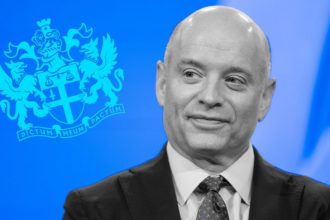The same day Overstock.com officially changed its name to Beyond Inc., as it assumed its new identity as the resurrected Bed Bath and Beyond brand, it also announced that CEO Jonathan Johnson was leaving the company effective immediately.
Johnson has been with the company since 2002 when he joined as general counsel. He was promoted to president in 2008, then picked up the pieces in 2019 after founder and longtime CEO Patrick Byrne crashed and burned.
Since then, Johnson reimagined the company from a cross-category liquidator to an exclusive home furnishings retailer. He then spearheaded the on-the-cheap acquisition of the Bed Bath and Beyond brand and IP assets in June. And he followed by bringing the brand back from the dead almost overnight online.
He was a steady hand managing the company at the time of the Byrne crisis, and he was the change agent the company needed to write its next chapter. Now he is out.
Replacing him as interim CEO is current Beyond President David Nielsen, who has been with the company six years working in marketing, merchandising, and sourcing operations. Current CFO Adrianne Lee will assume expanded responsibilities as well.
Pushed Out
Framed as a mutual decision, activist hedge fund investor JAT Capital Management, which owns nearly a 10% stake in the company, demanded Johnson’s ouster. In a November 2 letter to the board, JAT called for Marcus Lemonis to replace him. Lemonis joined the Beyond board in early October.
Lemonis is currently CEO of Camping World, the RV and outdoor retailer, and Good Sam, an RV owner’s organization. He also is a television personality known for his CNBC show “The Profit,” where he is credited as the “business turnaround king.”
“Mr. Lemonis is unquestionably the most qualified individual available to the Company to manage the business,” John Thaler, CIO of JAT, stated in the letter. “It is my strong belief that if the Company engages in an exhaustive executive search while dangling an option package as incentive, the Company will not find anyone more qualified than Marcus.”
Search Begins
The company, however, has decided to conduct such a search. It will be tough because qualified candidates are thin on the ground, though it will be an ideal time for Johnson to begin his job search.
Management consulting firm Korn Ferry
KFY
Nearly 60% were internal promotions rather than outside hires; whether it reflects good succession planning or necessity is to be determined. VF, Gap
GPS
DG
According to John Long, Korn Ferry’s North American retail leader, the average tenure for outgoing CEOs was a little over five years. And to his mind, that is not nearly long enough for a CEO to make their mark.
“It takes a while to turn things around and drive performance,” Long said, “I look at a minimum five-year time horizon for a large company to see sustained results. Hiring somebody and then saying after two years, it didn’t work is expecting too much of one person.”
Johnson got a lot less time than that. “Johnson’s departure from Beyond, Inc. doesn’t come as a complete shock, but still seems a curious turn of events,” shared Warren Shoulberg, retail columnist for Business of Home.
“It’s another example of private equity investors both looking out for their money and throwing their financial weight around, and not always in a good way,” he continued.
Kill The Messenger
From JAT’s perspective, Johnson wasn’t a suitable leader partly because he communicated poorly with the investment community. The company’s latest earnings report was a disappointment, but it may be a case where they are killing the messenger rather than helping the messenger deliver a different message.
“The near-universal feedback we have received is that the communication from the Company is either confusing or not helpful,” Thaler’s letter stated.
Confusing it may be, but that is a reflection of the times. VUCA – volatile, uncertain, complex and ambiguous –is the best way to describe the retail market in general and the home furnishings business in particular after the pandemic and the economy’s highs and lows since then.
“Despite poor recent results that were a surprise to the investment community, management was quoted as saying ‘we are on plan,’” Thaler added.
Turnarounds of the magnitude Johnson was trying to achieve at Beyond don’t happen in an instant, but instant gratification is just what JAT is expecting. Being on plan – taking it a step at a time – should have been reassuring that the company had an effective process in place and was executing it in a carefully measured way.
Shoulberg observed, “Everyone was expecting to see faster results in customer counts, orders and the integration of BBB-type products into the business, not to mention better bottom-line results in the past quarter. But is that on Johnson?”
He sees Johnson’s biggest weakness as coming from a legal background rather than a merchandising one. Yet he had a strong team in place that handled that for the company.
Perform And Transform
“Beyond Inc. needs a hard-core retail leader to take the company to the next level and fast,” Shoulberg continued. But unlike Lemonis’ “The Profit” show, transformational company change doesn’t happen in an instant.
Korn Ferry’s Long reminds us that activist investors were behind CEO replacements at the old Bed Bath and Beyond when it installed Mark Tritton and J.C. Penney’s appointment of Ron Johnson, both of which ended badly.
“Activist investors can oversimplify what needs to be done and much of what they seek to do are short term, not sustainable in the long term,” he said as he noted activist investors tend to be drawn to meddle in the retail industry with expectations of a quick return.
However, consumers are often slow to adapt to changes they find in a retailer they’ve come to trust over the years, and activist investors lose patience when quick returns are not realized.
“Being a retail CEO is a juggling act. Top people have to be able to do two things simultaneously that are really hard to do at the same time. They must perform – keep the business running – and transform – change the business,” he said. “It’s not binary, one or the other, but both. It’s like changing the plane’s engines while it’s in the air.”
In hindsight, Tritton and Ron Johnson were more focused on the Transform task and took their eye off the Perform part during their short tenures at their respective companies.
Most recently, Jonathan Johnson was by necessity preoccupied with transformation and should have been given more time to see the transformation through so that its performance could catch up after the transformation.
I spoke to Jonathan Johnson just days before the JAT letter hit and he must have seen the axe falling. “I love my job. I want to keep growing Bed Bath and Beyond,” he said and added, reflecting on his career, “There is more tread on this tire.”
See also:
Read the full article here





